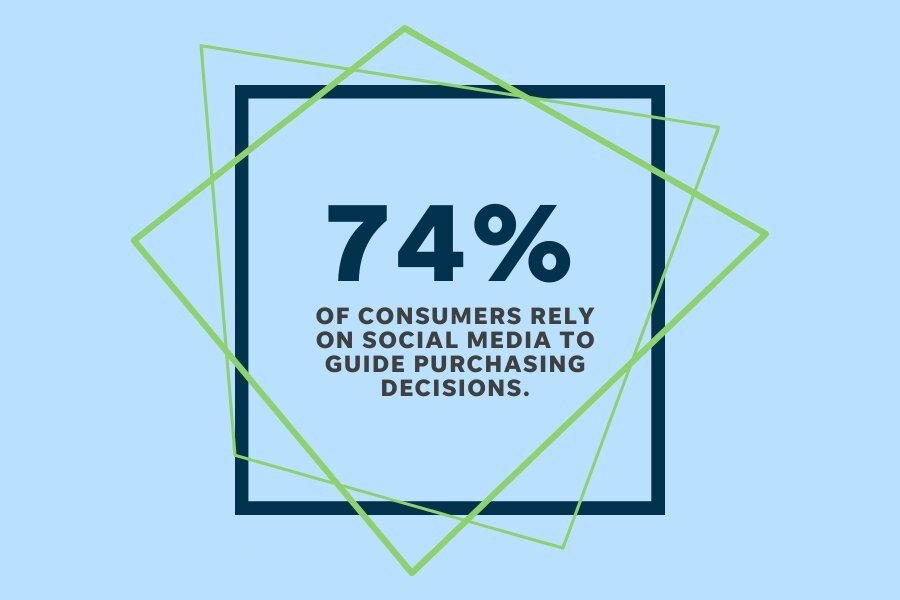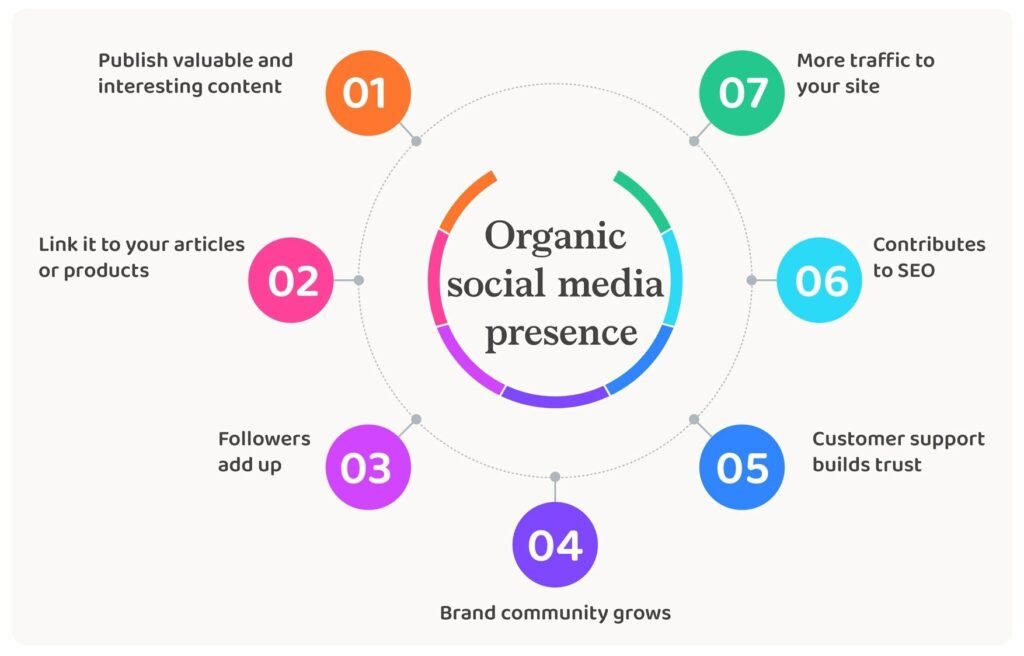
Social media is no longer an option for small businesses—it’s a necessity. With millions of active users on platforms like Facebook, Instagram, and Twitter, social media offers an unparalleled opportunity to build brand awareness, engage with customers, and drive growth. According to Hootsuite, 90% of social media users have used social platforms to communicate with a brand, and 71% of consumers who have a positive experience with a brand on social media are likely to recommend it to others.
In this guide, we’ll explore how small businesses can leverage social media to build their brand and engage their audience effectively.
The Power of Social Media for Small Businesses
Why Social Media Matters for Small Business Growth
For small businesses, social media offers a cost-effective way to compete with larger brands. It levels the playing field by providing direct access to your target audience. Whether you’re a local restaurant, boutique, or service provider, social media allows you to build relationships with customers, showcase your products, and receive instant feedback.
Key Statistics on Social Media Usage for Small Businesses
- 73% of marketers believe that social media marketing is somewhat or very effective for their business (Buffer).
- 54% of social browsers use social media to research products (GlobalWebIndex).
- 90% of Instagram users follow a business on the platform (Instagram Internal Data).
These statistics highlight the impact social media can have on a business’s visibility, customer engagement, and sales.

Benefits of Social Media for Small Businesses
Increased Brand Awareness and Reach
Social media allows you to reach a broader audience than traditional marketing methods. With billions of active users on platforms like Facebook, Instagram, and TikTok, even small businesses can engage with potential customers worldwide.
- Example: A local coffee shop might gain a global following by sharing behind-the-scenes videos of their brewing process or hosting live Q&A sessions.
Cost-Effective Marketing Solutions
One of the biggest advantages of social media marketing for small businesses is its affordability. You can build an online presence and engage with your audience without spending large amounts on traditional advertising.
- Tip: Organic content, like engaging posts and user-generated content, can be just as effective as paid ads in attracting followers and building loyalty.
Building Customer Trust and Engagement
Social media enables real-time communication with customers, allowing you to build trust and rapport. Responding to comments, answering questions, and showing appreciation for customer feedback can foster strong relationships.
- Fact: 71% of consumers who have a good social media experience with a business are more likely to recommend it to others (Sprout Social).
Driving Traffic to Your Website and Boosting SEO
Social media acts as a funnel for website traffic. By sharing blog posts, promotions, and other content, you can guide followers to your website where they can learn more about your products or services.

Key Platforms for Small Business Social Media Marketing
Each social media platform has its unique advantages. Here’s how you can leverage the most popular platforms for your small business:
Facebook for Small Businesses
With over 2.8 billion users, Facebook remains a powerful tool for small businesses. It’s ideal for building a community, engaging with customers, and running targeted ads. Use Facebook Groups to connect with local communities or interest-based groups related to your niche.
Instagram for Visual Branding
Instagram is a highly visual platform, perfect for businesses that want to showcase their products or services. High-quality images and videos, combined with features like Instagram Stories, can help businesses create an immersive brand experience.
- Pro Tip: Use Instagram’s shopping feature to allow customers to purchase products directly from your posts.
X (previously Twitter) for Real-Time Interaction
Twitter’s strength lies in real-time conversations. It’s ideal for customer support, sharing industry news, or participating in trending topics. Twitter allows small businesses to engage directly with customers and build rapport quickly.
LinkedIn for B2B Networking
For businesses targeting other businesses (B2B), LinkedIn is the go-to platform. It’s perfect for sharing industry insights, company updates, and professional networking. If you’re a small business looking to establish thought leadership, LinkedIn is an effective platform to build credibility.
TikTok for Creative Engagement
TikTok has exploded in popularity, especially among younger audiences. Short, creative video content can go viral quickly, making it an excellent platform for small businesses with creative content ideas.
- Example: A restaurant might share cooking tutorials or behind-the-scenes clips to attract followers.
Creating a Social Media Strategy for Your Small Business
Defining Your Goals and Audience
Before creating content, define clear, measurable goals. Are you looking to increase brand awareness, generate leads, or drive sales? Identifying your target audience will help you tailor content to their interests and behaviors.
Developing a Content Calendar
Consistency is key to successful social media marketing. A content calendar helps you plan posts in advance and ensures that you’re regularly engaging with your audience. Include important dates like product launches, holidays, and sales events in your calendar.
Content Ideas for Social Media
Coming up with fresh, engaging content is often a challenge for small businesses. Here are a few content ideas for social media:
- Behind-the-scenes content: Share what goes into making your product or service.
- Customer testimonials: Showcase positive feedback from satisfied customers.
- Contests and giveaways: Encourage engagement by offering prizes for likes, shares, or tags.
- Educational posts: Share tips, tutorials, or how-to guides that relate to your business.
Leveraging User-Generated Content and Hashtags
Encourage your customers to share their experiences with your brand by creating a branded hashtag. This increases your brand’s visibility and provides social proof that can influence other potential customers.
Running Effective Paid Ads
If your goal is to drive conversions quickly, consider running social media ads. Platforms like Facebook and Instagram offer targeted advertising options that allow you to reach specific demographics based on interests, location, and behavior.
Social Media Management Tools for Small Businesses
Time-Saving Tools for Social Media Management
Managing social media can be time-consuming. Thankfully, tools like Hootsuite, Buffer, and Sprout Social allow you to schedule posts, manage multiple accounts, and monitor engagement from one dashboard.
Tracking and Measuring Social Media Performance
To ensure your social media efforts are paying off, track key metrics like engagement, reach, and website traffic. Tools like Google Analytics and Facebook Insights provide valuable data to help you optimize your strategy.
Common Mistakes Small Businesses Make on Social Media
Posting Without a Plan
Many small businesses post sporadically or without a clear strategy. A content calendar ensures you’re consistently posting content that aligns with your business goals.
Ignoring Customer Interactions
One of the biggest mistakes is ignoring customer comments, questions, or complaints. Engaging with your audience in a timely manner helps build trust and shows that you value their feedback.
Over-Promoting Without Adding Value
If all your posts are promotional, followers may lose interest. Focus on creating value-driven content that educates or entertains your audience, in addition to occasional promotions.
Inconsistent Branding Across Platforms
Your brand should have a consistent voice and visual identity across all platforms. Inconsistent branding can confuse customers and weaken your business’s online presence.
Why Social Media Marketing is Critical for Long-Term Business Growth
Building a Loyal Community of Followers
Social media enables you to foster a loyal community of followers who engage with your brand on a personal level. This connection can lead to long-term customer loyalty and word-of-mouth referrals.
Staying Competitive in a Crowded Market
With millions of businesses competing for attention online, social media can help your brand stand out. Regularly engaging with your audience and sharing valuable content will keep your business top-of-mind.
Driving Sales Through Engagement and Promotions
Engaging content and well-timed promotions can turn followers into paying customers. Use social media to announce limited-time offers, new product launches, and exclusive discounts.
Why Work with our Digital Marketing Agency for Small Business
Expertise in Social Media Strategy and Execution
Managing a successful social media presence requires planning, creativity, and consistency. At our agency, we specialize in social media management for small businesses, providing expert strategies tailored to your unique needs.
Comprehensive, Cost-Effective Digital Marketing Solutions
Social media management can be time-consuming and challenging, but it’s just one piece of a broader digital marketing strategy. We offer all-inclusive digital marketing packages, including SEO, website development, content creation, and social media marketing, at a fraction of the cost of traditional agencies. Instead of paying thousands per month for a single service, we bundle all your marketing needs into affordable packages with unparalleled support.
Long-Term Support for Evolving Businesses
Our focus is on helping small businesses and startups thrive. Whether you’re looking to build your brand from scratch or expand your existing presence, we provide long-term digital marketing support. We’ll be by your side, ensuring your social media strategy grows as your business evolves. Reach out to us today, and let’s start transforming your business!
Conclusion: Start Building Your Social Media Presence Today
Social media offers small businesses the tools they need to build brand awareness, engage with customers, and drive business growth. By leveraging the right platforms, creating valuable content, and engaging with your audience, you can elevate your business’s online presence.
Ready to take your social media marketing to the next level? Contact us today, and let’s work together to create a social media strategy that delivers results.
FAQs About Social Media for Small Businesses
1. How often should small businesses post on social media?
It’s recommended that small businesses post 3-5 times per week on platforms like Facebook and Instagram to maintain engagement. Consistency is more important than frequency.
2. What social media platform is best for small businesses?
The best platform depends on your business. Instagram is great for visual content, Facebook for community building, and LinkedIn for B2B networking. Choose platforms where your target audience is most active.
3. How can I get more followers for my small business on social media?
To grow your following, post engaging content, run contests or giveaways, use relevant hashtags, and encourage your existing customers to follow and share your profiles.
4. How much does social media management cost for small businesses?
Social media management can range from $500 to $5,000+ per month, depending on the scope of services. Our agency offers affordable packages that include social media management alongside other digital marketing services.
5. Can I manage my own social media marketing, or do I need a professional?
You can manage your own social media marketing, but hiring a professional agency ensures consistency, strategy, and effective execution. Agencies also save time and provide expertise to drive better results.
6. How does social media impact SEO for small businesses?
Social media indirectly boosts SEO by driving traffic to your website, increasing brand visibility, and generating backlinks from shared content. Social engagement signals also enhance search engine rankings.